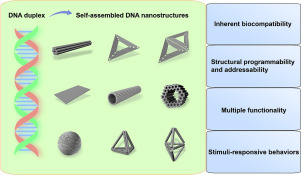当前位置:
X-MOL 学术
›
Adv. Drug Deliver. Rev.
›
论文详情
Our official English website, www.x-mol.net, welcomes your feedback! (Note: you will need to create a separate account there.)
Rationally designed DNA-based nanocarriers.
Advanced Drug Delivery Reviews ( IF 16.1 ) Pub Date : 2019-02-12 , DOI: 10.1016/j.addr.2019.02.003 Qiao Jiang 1 , Shuai Zhao 2 , Jianbing Liu 1 , Linlin Song 2 , Zhen-Gang Wang 1 , Baoquan Ding 3
Advanced Drug Delivery Reviews ( IF 16.1 ) Pub Date : 2019-02-12 , DOI: 10.1016/j.addr.2019.02.003 Qiao Jiang 1 , Shuai Zhao 2 , Jianbing Liu 1 , Linlin Song 2 , Zhen-Gang Wang 1 , Baoquan Ding 3
Affiliation

|
Nanomaterials employed for enhanced drug delivery and therapeutic effects have been extensively investigated in the past decade. The outcome of current anticancer treatments based on conventional nanoparticles is suboptimal, due to the lack of biocompatibility, the deficient tumor targeting, the limited drug accumulation in the diseased region, etc. Alternatively, DNA-based nanocarriers have emerged as a novel and versatile platform to integrate the advantages of nanotechnologies and biological sciences, which shows great promise in addressing the key issues for biomedical studies. Rather than a genetic information carrier, DNA molecules can work as building blocks to fabricate programmable and bio-functional nanostructures based on Watson Crick base-pairing rules. The DNA-based materials have demonstrated unique properties, such as uniform sizes and shapes, pre-designable and programmable nanostructures, site-specific surface functionality and excellent biocompatibility. These intrigue features allow DNA nanostructures to carry functional moieties to realize precise tumor recognition, customized therapeutic functions and stimuli-responsive drug release, making them highly attractive in many aspects of cancer treatment. In this review, we focus on the recent progress in DNA-based self-assembled materials for the biomedical applications, such as molecular imaging, drug delivery for in vitro or in vivo cancer treatments. We introduce the general strategies and essential requirements for fabricating DNA-based nanocarriers. We summarize the advances of DNA-based nanocarriers according to their functionalities and structural properties for cancer diagnosis and therapy. Finally, we discuss the challenges and future perspectives regarding the detailed in vivo parameters of DNA materials and the design of intelligent DNA nanomedicine for individualized cancer therapy.
中文翻译:

合理设计基于DNA的纳米载体。
在过去的十年中,已广泛研究了用于增强药物递送和治疗效果的纳米材料。由于缺乏生物相容性,肿瘤靶向性不足,患病区域药物积累有限等原因,目前基于常规纳米粒子的抗癌治疗效果欠佳。整合纳米技术和生物科学的优势,这在解决生物医学研究的关键问题方面显示出巨大的希望。DNA分子可以作为构建基块,而不是遗传信息载体,根据Watson Crick碱基配对规则制造可编程的和具有生物功能的纳米结构。基于DNA的材料具有独特的性能,例如均匀的尺寸和形状,可预先设计和编程的纳米结构,特定于位置的表面功能以及出色的生物相容性。这些引人入胜的特征使DNA纳米结构能够携带功能部分,以实现精确的肿瘤识别,定制的治疗功能和刺激性药物释放,从而使其在癌症治疗的许多方面都具有很高的吸引力。在这篇综述中,我们关注于生物医学应用中基于DNA的自组装材料的最新进展,例如分子成像,用于体外或体内癌症治疗的药物递送。我们介绍了制造基于DNA的纳米载体的一般策略和基本要求。我们根据其功能和结构特性总结了基于DNA的纳米载体在癌症诊断和治疗中的进展。
更新日期:2019-11-18
中文翻译:

合理设计基于DNA的纳米载体。
在过去的十年中,已广泛研究了用于增强药物递送和治疗效果的纳米材料。由于缺乏生物相容性,肿瘤靶向性不足,患病区域药物积累有限等原因,目前基于常规纳米粒子的抗癌治疗效果欠佳。整合纳米技术和生物科学的优势,这在解决生物医学研究的关键问题方面显示出巨大的希望。DNA分子可以作为构建基块,而不是遗传信息载体,根据Watson Crick碱基配对规则制造可编程的和具有生物功能的纳米结构。基于DNA的材料具有独特的性能,例如均匀的尺寸和形状,可预先设计和编程的纳米结构,特定于位置的表面功能以及出色的生物相容性。这些引人入胜的特征使DNA纳米结构能够携带功能部分,以实现精确的肿瘤识别,定制的治疗功能和刺激性药物释放,从而使其在癌症治疗的许多方面都具有很高的吸引力。在这篇综述中,我们关注于生物医学应用中基于DNA的自组装材料的最新进展,例如分子成像,用于体外或体内癌症治疗的药物递送。我们介绍了制造基于DNA的纳米载体的一般策略和基本要求。我们根据其功能和结构特性总结了基于DNA的纳米载体在癌症诊断和治疗中的进展。



























 京公网安备 11010802027423号
京公网安备 11010802027423号